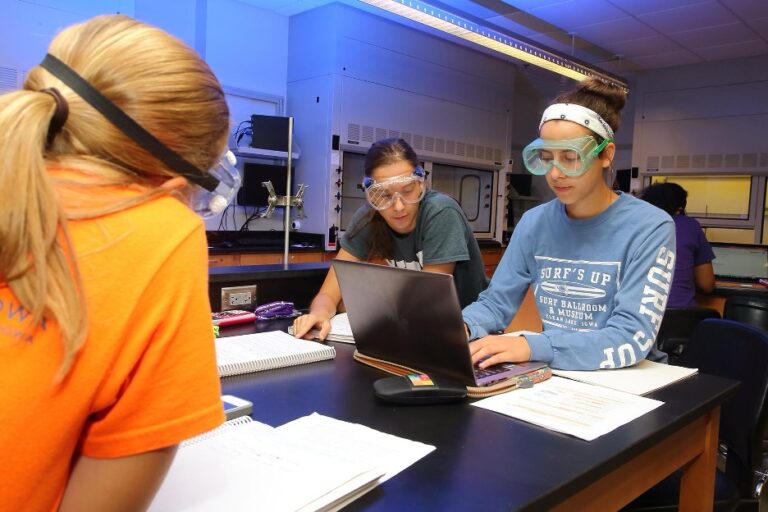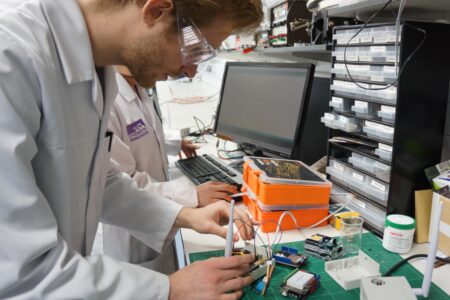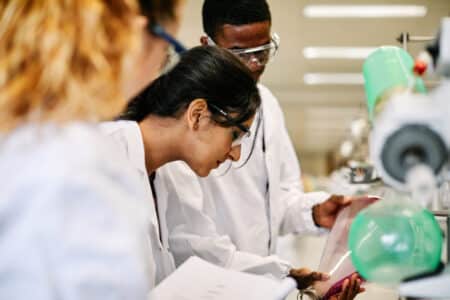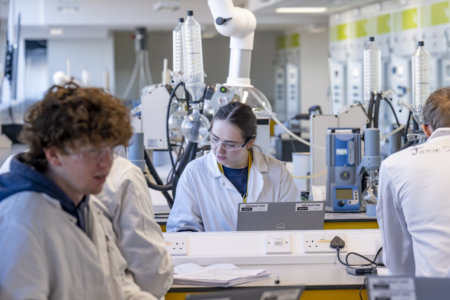
Chemistry’s like peering into the world with a magnifying glass. Oftentimes, literally. It exists in every piece of tech, in each spoonful of food, in our skin. It’s pinning down your understanding into each molecule, and how the natural world processes around us. It’s knowledge as good as gold.
And because chemistry exists in practically everything, it’s a door open to countless career opportunities should you attain a degree. Chemistry is no. 34 out of the most popular degrees in the US, with more than 50,000 enrolled in a programme. It’s a degree that leads into many disciplines, whether you’re looking to revolutionise healthcare and drug prescriptions, or become a consultant in environmental fields. The second you step into a lab at university, that’s an impetus in itself to change the world.
Many students take it a step further, choosing to pursue a master’s or PhD in chemistry to conduct further independent research and or increase their credibility, earning the chance to advance to higher positions in future employment. But to take that leap, you have to start with a good chemistry school.
So here are three leading chemistry and biochemistry programmes in America, to do just that.
University of Northern Iowa

Students at UNI are given several once-in-a-lifetime opportunities to study chemistry and biochemistry in ways typically unheard of. Source: University of Northern Iowa
There are only three universities in the world that can enter the isolated depths of the Wind Cave in South Dakota — one of the oldest caves out there, stretching 170 miles of passageways and an ecosystem that’s been untouched for more than 10,000 years. The University of Northern Iowa (UNI) is one of them. Through the Astrobiology Underground Project funded by NASA, a UNI undergraduate team is tracing the minerals and microorganisms surviving in those extremities, guided by expert faculty. Together, they’re examining microbial life in nutrient-limited environments.
That’s where being a student in the Department of Chemistry & Biochemistry gets you. Through hands-on experiences and cutting-edge research — both above and below ground — it encourages innovation and exploration.
Whether you’re studying extraterrestrial life or synthesizing new materials— UNI inspires you to identify the world’s gaps and teaches you to close them through science. On campus, the McCollum Science Hall is filled with dozens of laboratories equipped with advanced technology fit for problem-solving. Students even take the time to build their own instruments, and none of their efforts go unnoticed. With a 100% acceptance rate into medical programmes and high opportunities for industry jobs and doctoral success, it’s safe to say everyone achieves the outcomes they want.
While achievements are diverse, most UNI graduates owe their success to exposure. As a UNI student, you can publish your research in professional journals and showcase your critical thinking at national conferences. Off-campus, you can get experience in your area of interest with industry internships. Back on campus, you could network as a member of the American Chemical Society or participate in the Summer Undergraduate Research Programme, which offers a 10-week paid research experience under a faculty member. That’s what a UNI education is all about — going beyond the classroom to uncover new facets of the field you’re most passionate about.
Learn more about UNI’s Department of Chemistry and Biochemistry.

There are plenty of internship opportunities in the local Southwest Virginia area to garner industry experience in science research. Source: Virginia Tech / Facebook
Virginia Tech
Batteries power much of the world, and chemistry has the power to shift the landscape of sustainability. Lithium-ion batteries exist in our everyday — cellphones, laptops, electric vehicles. The problem with them is that they tend to overheat, run the risk of catching fire, and the extraction of lithium’s harsh on the environment. But there’s a new alternative being researched by associate professor of chemistry Feng Lin and his team at Virginia Tech: sodium-ion. It’s a plausible solution to short-range electric vehicles, and large-scale energy storage systems. It could decrease the risks in the manufacture of batteries.
Whether it’s electrochemistry, or molecular living organisms — Virginia Tech offers a place to break it down into bits, at the College of Science.
The Department of Chemistry at Virginia Tech produces about 50 BS and BA chemistry majors each year, which ranks in the top 50 total graduates out of over 600 universities offering an accredited degree by the American Chemical Society. That speaks to their quality of education. There are a few programmes you can pursue: a BA or a BS in Chemistry, a BS in Medicinal Chemistry, a BS in Polymer Chemistry, and you can choose to add a minor. If your interest leans more towards living organisms and molecular mechanisms, then check out the biochemistry major.
Experiential learning is a priority at Virginia Tech. They will ensure you get involved in undergraduate research, internships, or service-learning so that you wind up applying what you’ve learnt in the lectures to the real, professional world. They’ve got graduates that have gone on to be professors, medical doctors, pharmacists, and so forth; the other half of them gaining employment right as they step out of graduation.
Learn more about Virginia Tech and their undergraduate chemistry programmes here.

Rice University offers 49 undergraduate majors in the Department of Chemistry. Source: Rice University / Facebook
Rice University
The Rice University Department of Chemistry is rolling in research pioneers and awards. Rice chemist Gustavo Scuseria won the 2024 Schrödinger Medal, for his work in coupled cluster, density functional and symmetry projection theories and the modelling of carbon nanostructures. Minjung Kim, now an alum, was a recipient of the merit-based Paul & Daisy Soros Fellowships for New Americans — an award dedicated to immigrants and children of immigrants. She’s now pursuing a PhD in chemistry at Northwestern University. Rice Chemist Han Xiao was awarded nearly US$2 million from the National Institute of Health for his work in revolutionising cellular functions.
It only makes sense, considering the Department of Chemistry’s ranked no. 27 in the nation.
The chemistry programme’s produced two Nobel Laureates, four members of the National Academy of Sciences, and they’ve got 60 faculty members affiliated with the chemistry department who often cross over into other disciplines. That’s how they approach learning and research at Rice university — through interdisciplinary teaching so you’re growing a diverse set of skills. The undergraduate programme takes a comprehensive approach, so you’ll take on each facet of chemistry. You’re supported by state-of-the-art instrumentation and personalised attention from your professors, and contextualise that in actual work.
Rice University is a member of the Texas Medical Center (TMC), the largest medical complex in the world just five minutes a drive from the campus. So while students often work with professors, many are encouraged to also conduct research outside the campus lab setting, with TMC. Students involved with research typically work three hours per week — or 42 hours over the semester — for each credit hour, and later enrol in a course to conduct independent research.
Click here to learn more about Rice University’s BA or BS in Chemistry.
*Some of the institutions featured in this article are commercial partners of Study International










